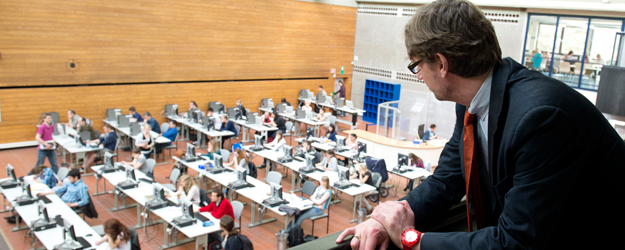21 May 2012
On May 30th, the University Library (UB) of Johannes Gutenberg University Mainz (JGU) will be playing host to a conference with experts which is dedicated to a very topical subject: "Plagiate & Co – Wissenschaftliches Fehlverhalten ist (k)ein Kavaliersdelikt" ("Plagiarism and other transgressions – Academic misconduct is (not) a trivial offense"). Prior to this, UB director Dr. Andreas Brandtner talks about the nature of plagiarism and the objectives of the conference.
Karl-Theodor zu Guttenberg, Silvana Koch-Mehrin, Jorgo Chatzimarkakis – all were stripped of their doctorates. And these are only the most well-known plagiarists who have recently been unmasked; the list actually goes on and on. It seems that copying the work of others has never been so much in fashion.
"Currently, politicians and celebrities are specifically checked. There is actually an online community that specializes in targeting them," says Dr. Andreas Brandtner, who has been director of JGU's University Library since February 2011. "I experienced it myself in the case of the Austrian Minister for Science, Johannes Hahn, when I was still at the University of Vienna. We immediately took his work out of circulation and checked it. It now looks as if something similar is happening with Annette Schavan. And this is, of course, a problem, as the Federal Minister of Education, of all people, has to be seen to be a paragon of respectability when it comes to research and teaching."
Democratized hunt for plagiarists
Brandtner believes that there is one simple cause of the seemingly endless chain of plagiarism revelations. "People can now compare texts electronically. It makes it much easier to cross-check publications and democratizes the process. A lot can be done by simply using Google." In principle, everybody who has ever used a search engine knows that all you have to do is enter a sentence and see what hits you get.
"Universities are now looking into how to carry out plagiarism checks. Not only was former Defense Minister Guttenberg damaged by the plagiarism scandal, but the reputation of the University of Bayreuth and his dissertation supervisors have also suffered. But you are left wondering how it was possible that a dissertation could be graded summa cum laude without being properly reviewed."
Students under general suspicion?
In Vienna, it is standard practice to double-check all papers using plagiarism-recognition software. "Everybody has to submit their work electronically. This is then routinely checked." Brandtner is not really sure that this would work in Mainz. "Some professors already use this software. But if we centralize the system, it would give the impression that we generally do not trust our students." Moreover, he is unsure if this software is really such a panacea. "I've heard that many versions are worse than Google."
He expects to find an answer on May 30th, when the UB opens its doors for "Plagiate & Co – Wissenschaftliches Fehlverhalten ist (k)ein Kavaliersdelikt", a conference being held as part of the General Studies program. "We will have experts in Mainz and will talk to them about this issue both during and outside the conference." The UB has two other programs on offer that deal with this issue: "We have included a course in our training program to raise awareness of plagiarism and we have set up an online tutorial."
Plagiarism remains a problem
Despite all of the measures, conferences, and electronic options, Brandtner is convinced that plagiarism will remain a problem. "Plagiarism is pretty easy. For example, I could get someone to translate an academic publication from Uzbekistan for me," he smirks. "There would be no real way to check it." Language barriers would prevent it. The situation in the case of medical publications is similar. These appear in China under somebody else's name in the form of exact translations. And there they don't even consider stealing work to be particularly reprehensible.
"It is not only that other cultures see the problem differently," Brandtner adds. It seems that a transformation has also occurred over the years. "Thirty years ago, the use of paraphrases in dissertations was more accepted than today. Academic practice has become much more rigid."
Copyright protection is a new concept
He looks back even further. "Copyright law has not been around for all that long." The protection of original work is a relatively new concept. "Even as late as the eighteenth century, text production was primarily viewed as a process of compilation." Only works drawn from important sources were accorded any weight and credibility.
"The internet and Wikipedia are now creating a similar phenomenon." Mash-ups, the combining of existing texts to create a new one, are very popular. "My generation is still heavily influenced by the concept of copyright protection, but will the next generation see things in the same way? I could imagine the attitude of my son might be: These texts are online, so I can use them. Where's the problem? The discussion at the conference promises to be interesting."
Plagiarism is not a trivial offense
It will cover a lot more: In the wake of the Bologna reforms, do students even have enough time to write original texts or do they need to copy because of time pressures? How great is the risk of becoming a victim of plagiarism if you publish your work online? And are there even enough supervisors to cope with all the papers requiring review? Perhaps teaching staff are not able to carefully check the flood of texts for plagiarism?
So there will be plenty to talk about on May 30th. However, Brandtner is already sure of one thing: "We can never drop our guard when it comes to plagiarism. Plagiarism ruins reputations."



